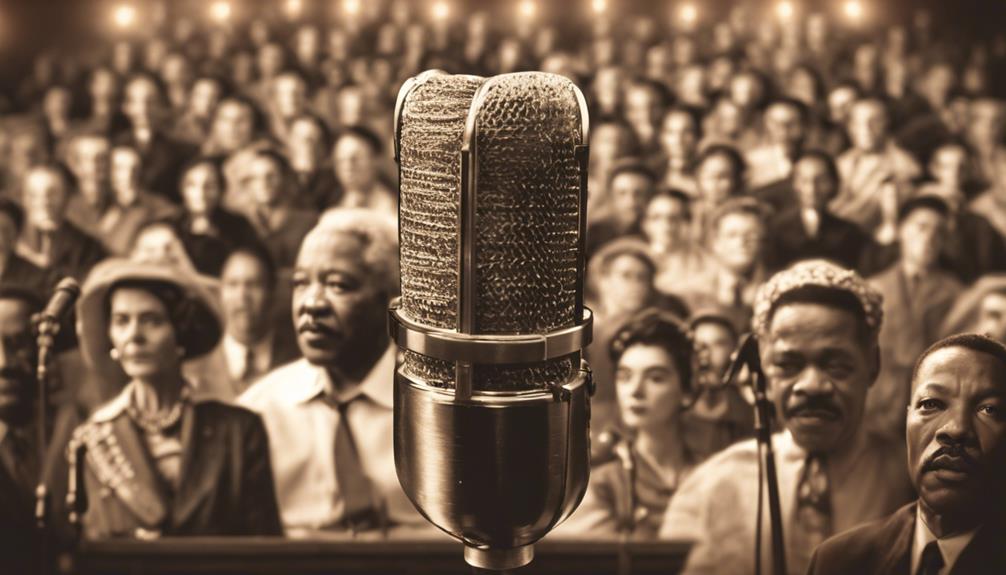You're about to discover the voices that shaped our world! Famous public speakers like Martin Luther King Jr., Winston Churchill, and Nelson Mandela changed the course of history with their powerful words. Their iconic speeches sparked revolutions, fought for rights, and inspired hope. From Churchill's Nobel Prize-winning oratory skills to King's "I Have a Dream" speech, these legendary figures proved that the right words can ignite movements and defend principles. As you explore their stories, you'll uncover the secrets behind their influential voices and discover how they continue to inspire us today. Want to know more about the voices that shaped our world?
Key Takeaways
- Martin Luther King Jr., Winston Churchill, and Nelson Mandela are renowned for their impactful speeches that shaped history and inspired monumental social change.
- Mastering rhetorical devices, emotional appeals, and effective communication skills have inspired monumental social and political change throughout history.
- Famous public speakers have used their speeches to influence war, civil rights, and social justice movements, sparking revolutions for rights and freedoms.
- Legendary orators, such as Socrates, Adolf Hitler, and John F. Kennedy, are historical figures known for their influential speeches and communication styles.
- Voices of freedom, social justice, and gender equality, including Barack Obama, Malala Yousafzai, and Sheryl Sandberg, continue to inspire hope and unity through their speeches.
Famous Public Speakers Throughout History
Throughout history, you've likely been inspired by the powerful oratory skills of iconic figures who've shaped the course of human events with their words.
These famous public speakers have left an indelible mark on the world, using their speeches to advocate for social change, civil rights, and human dignity.
Take Martin Luther King Jr., for instance, who delivered impactful speeches that led to significant social change during the Civil Rights Movement.
Winston Churchill, known for his powerful speeches during WWII, won the Nobel Prize in Literature in 1953 for his contribution to public speaking.
Mahatma Gandhi, through his Quit India Speeches, inspired nonviolent resistance against British colonial rule in India.
John F. Kennedy spent months crafting his speeches, engaging audiences with his authentic and compelling communication style.
And Nelson Mandela, a courageous and passionate speaker, used his speeches to advocate for human dignity and social justice, leaving a lasting impact on the fight against apartheid in South Africa.
These iconic figures have shown us the power of effective communication, inspiring generations to come.
Speeches That Changed the World
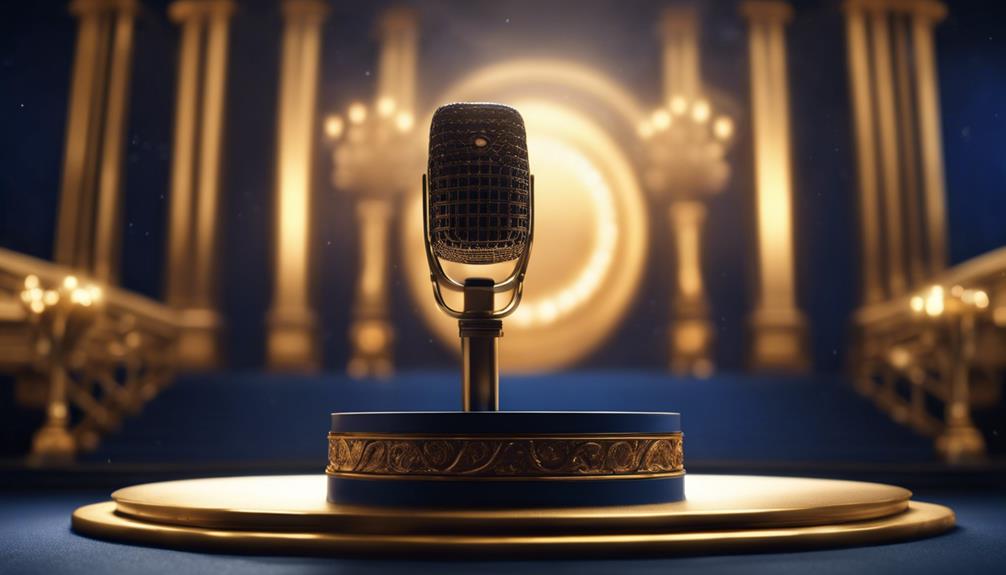
As you explore the world of famous public speakers, you're about to discover the power of speeches that changed the course of history. Get ready to uncover the rhetoric of revolution, words of war, and voices of freedom that inspired massive change.
From fuelling freedom movements to shaping the fate of nations, these iconic speeches will leave you in awe of their impact.
Rhetoric of Revolution
When you examine the most pivotal moments in history, you'll find that a handful of speeches have had a profound impact on shaping the course of human events. These speeches didn't just inspire change – they sparked revolutions.
Take Martin Luther King Jr.'s iconic 'I Have a Dream' speech, which fueled the Civil Rights Act and addressed a crowd of 250,000 people with well-researched content.
Or Mahatma Gandhi's Quit India speeches, which fueled the independence movement in India with powerful rhetoric and calls for nonviolent resistance.
Then there's Ronald Reagan's Brandenburg Gate address, which challenged Soviet leader Gorbachev during the Cold War and influenced the eventual fall of the Berlin Wall in 1989. These speeches didn't just change the game – they rewrote the rules.
They emphasized the importance of human dignity and equality on a global scale, as seen in Eleanor Roosevelt's address to the United Nations on the Universal Declaration of Human Rights.
These powerful speeches ignited the flames of revolution, inspiring people to fight for their rights and freedoms.
Words of War
You've witnessed the power of speeches that sparked revolutions, but now you're about to experience the impact of words that shaped the course of war and global conflict.
During WWII, Winston Churchill's speeches inspired hope and resilience in the face of adversity, rallying the British people to stand strong against the Nazi regime.
Meanwhile, across the Atlantic, Martin Luther King Jr.'s iconic 'I Have a Dream' speech led to the Civil Rights Act, addressing 250,000 people with well-researched content that still resonates today.
Nelson Mandela's passionate speeches on human dignity and social justice advocated for democratic ideals, while Ronald Reagan's Brandenburg Gate Address challenged Soviet leader Gorbachev, influencing the end of the Cold War.
And let's not forget James Baldwin's intense social commentary on race in America, pushing conversations forward and influencing discussions on racial issues.
These powerful orators have left an indelible mark on history, proving that words can be just as potent as swords in shaping the course of human conflict.
Voices of Freedom
Throughout history, powerful speakers have harnessed the might of their words to inspire freedom, equality, and justice, leaving an indelible mark on the course of human progress. You're about to meet the voices that shaped our world, fighting for what's right and just.
Martin Luther King Jr., a renowned civil rights activist, delivered his iconic 'I Have a Dream' speech, addressing 250,000 people with well-researched content that inspired the Civil Rights Act.
Nelson Mandela, South Africa's first black President, courageously spoke on human dignity and social justice, willing to die for democratic ideals.
Barack Obama, known for his eloquence and charisma, emphasizes unity and hope in his speeches while advocating for social justice and equality.
You might be surprised to know that Malala Yousafzai, the youngest Nobel Peace Prize laureate, delivers powerful speeches advocating for girls' education and women's rights with striking vocal power.
And did you know that Sheryl Sandberg promotes gender equality and women's leadership in the workplace, raising awareness about gender biases and challenges?
These voices of freedom have changed the world with their words, and you're about to discover how.
The Power of Public Speaking
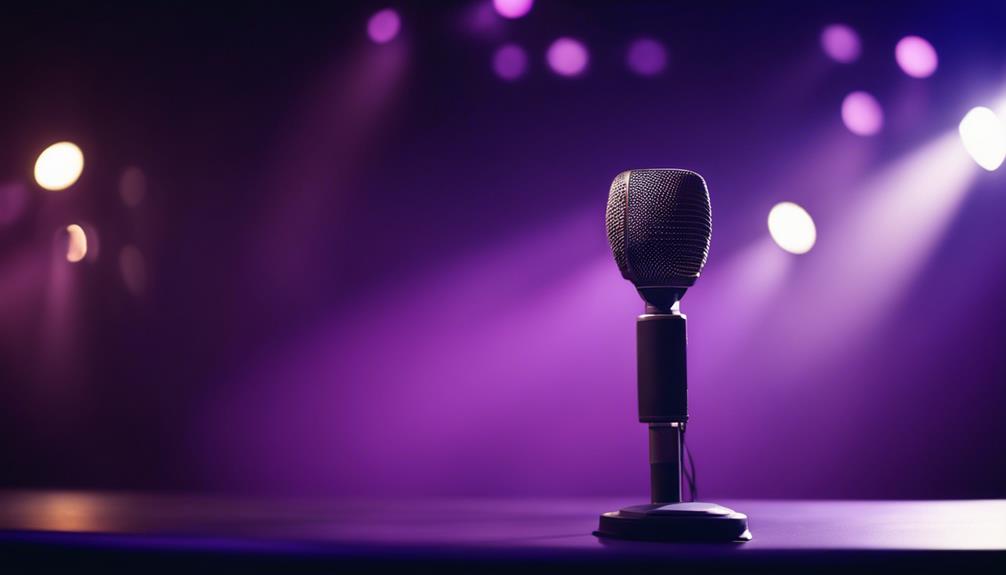
By harnessing the power of public speaking, individuals like Martin Luther King Jr., Winston Churchill, and Mahatma Gandhi have inspired monumental social and political change, demonstrating the profound impact of this ancient art on human history.
You might wonder, what makes their speeches so impactful? Here are a few key takeaways:
- Mastering rhetorical devices: They know how to use metaphors, allusions, and repetition to make their message unforgettable.
- Crafting emotional appeals: They tap into their audience's emotions, making their message resonate deeply.
- Delivering iconic speeches: Who can forget Martin Luther King Jr.'s 'I Have a Dream' speech?
- Developing leadership skills: Effective communication is key to inspiring others and driving change.
Influential Voices of the Past
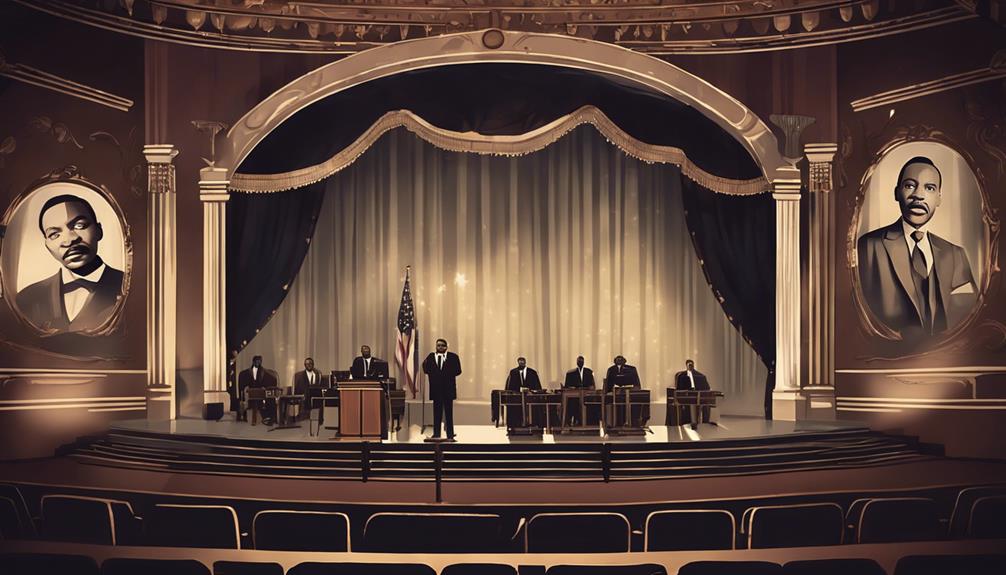
As we explore the world of influential voices of the past, we're reminded that charismatic leaders like Winston Churchill, Martin Luther King Jr., and John F. Kennedy have forever etched their mark on history through their powerful oratory skills. These iconic figures knew how to captivate audiences and inspire change.
Take Churchill, for instance, who rallied Britain during WWII with his stirring speeches. Similarly, King Jr.'s 'I Have a Dream' speech continues to resonate with people today, emphasizing the importance of character over skin color. Even Socrates, centuries ago, defended his pursuit of truth in Athens, refusing to back down in the face of accusations.
On the other hand, Adolf Hitler skillfully used metaphors to promote his political agenda, highlighting the impact of public speaking skills on shaping public opinion. John F. Kennedy, known for his compelling communication style, spent months crafting speeches that engaged his audience in authentic conversations.
These influential voices of the past have left an indelible mark on history, reminding us that the power of public speaking can be both inspiring and transformative.
Shaping History With Words

As you explore the world of famous public speakers, you'll discover that some voices have changed the course of history. From words that sparked liberation to rhetoric that fueled revolutions, these speakers didn't just make speeches – they shaped the world we live in today.
Get ready to uncover the powerful words that gave birth to new eras of freedom, equality, and justice.
Words of Liberation Born
Through the power of their words, legendary orators have reshaped the course of history, inspiring monumental changes that continue to resonate with us today. You've likely heard of some of these iconic speakers, but let's revisit their impact.
Here are a few examples of how they've used their words to spark liberation:
- Martin Luther King Jr.'s 'I Have a Dream' speech ignited the Civil Rights movement, demanding equality and justice for all.
- Nelson Mandela's passionate speeches fought for human dignity and social justice, paving the way for democratic reforms.
- Malala Yousafzai's courageous speeches advocate for girls' education and women's rights, inspiring a global movement.
- Barack Obama's eloquent speeches emphasized unity, hope, and equality, while Sheryl Sandberg champions gender equality in the workplace.
These speakers have shown us that words can be a powerful catalyst for change. They've used their platforms to raise awareness about social justice, equality, and gender equality, inspiring generations to come.
Rhetoric of Revolution
You stand at the threshold of a revolution, where the power of words ignites flames of change, reshaping the course of history. Famous public speakers, with their remarkable rhetoric, have led the charge, inspiring masses and altering the trajectory of human events.
Take Martin Luther King Jr., for instance, whose iconic 'I Have a Dream' speech rallied 250,000 people and paved the way for the Civil Rights Act. Nelson Mandela's passionate orations on human dignity and social justice reflected his unwavering courage in the face of adversity. Winston Churchill's powerful delivery and masterful use of the English language earned him a Nobel Prize in Literature.
Even Adolf Hitler, despite his misguided ideology, demonstrated the persuasive power of skilled public speaking. And let's not forget Socrates, who stood firm in his commitment to truth, even in the face of accusations. These legendary speakers show that the right words, spoken with conviction, can spark revolutions and reshape the world.
Voices of Defiance
In the face of oppression, tyranny, and injustice, voices of defiance have risen to shape the course of history with words that ignite, inspire, and challenge the status quo.
You might be thinking, 'What exactly do I mean by 'voices of defiance'?' Well, let me tell you – these are the individuals who refused to back down, who stood up against the norms, and who fought for what they believed in.
Here are a few examples of these courageous individuals:
- Nelson Mandela, who fought against apartheid in South Africa, inspiring social change and justice.
- Martin Luther King Jr., who championed civil rights and equality, leading to significant legislative reforms.
- Winston Churchill, who rallied the British people with his eloquent speeches during World War II, boosting morale and hope.
- Socrates, who fearlessly defended truth and principle in ancient Athens, challenging societal norms.
On the flip side, we've Adolf Hitler, who used public speaking to promote his political agenda and incite mass support, with devastating consequences.
These voices of defiance remind us that words have power, and it's up to us to use them for good or evil.
Legendary Orators of Our Time
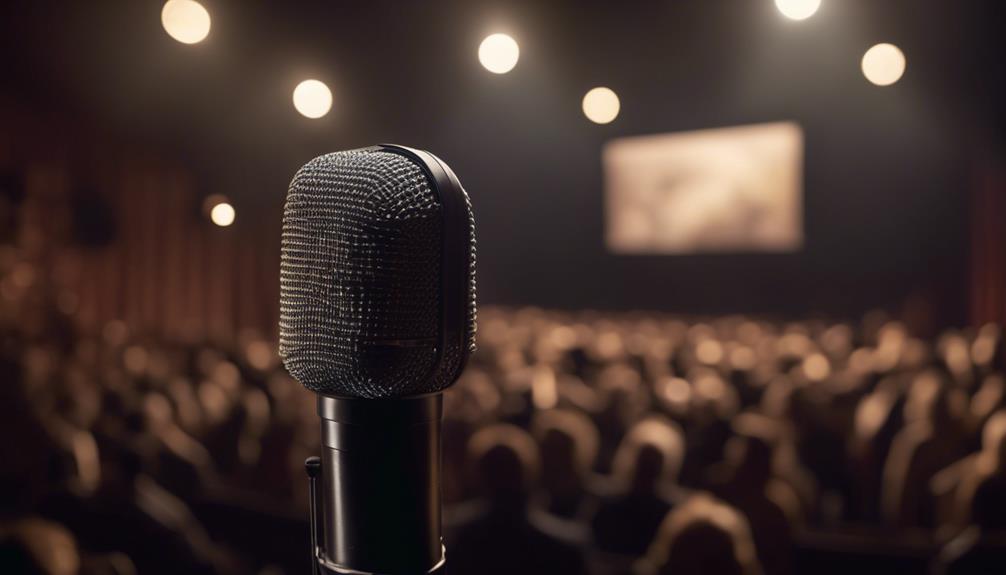
Among the most iconic figures of our time, legendary orators have captivated audiences with their impassioned words, motivating generations to work towards a better world. You might be wondering who these incredible individuals are. Let's take a closer look!
Winston Churchill's powerful speeches during WWII inspired hope and resilience in the face of adversity.
Martin Luther King Jr.'s iconic 'I Have a Dream' speech led to the Civil Rights Act and addressed 250,000 people with well-researched content.
Nelson Mandela, the first black President of South Africa, courageously and passionately spoke about human dignity and social justice, willing to die for democratic ideals.
And who can forget Barack Obama, known for his eloquence and charisma, emphasizing unity and hope, connecting with diverse audiences and advocating for social justice and equality?
These legendary orators have demonstrated exceptional oratory skills, delivering iconic speeches that have shaped our world. Their messages of social justice, equality, and hope continue to inspire the public to work towards a better world.
Frequently Asked Questions
Who Is the Greatest Public Speaker of All Time?
You're probably wondering who's the greatest public speaker of all time, and it's a tough call, but considering the impact of their speeches, I'd say Martin Luther King Jr. takes the crown – his words still resonate deeply with people today.
Which Public Speaker Has Influenced Your Life?
You've been inspired by Malala Yousafzai's bravery, and her words "One child, one teacher, one book, one pen can change the world" echo in your mind, motivating you to stand up for girls' education and challenge oppressive systems.
Who Is the World's Most Influential Speaker?
You're wondering who's the world's most influential speaker? Honestly, it's tough to pick just one, but if you had to choose, Martin Luther King Jr.'s powerful message of equality and hope resonates with you, making him a strong contender for the top spot.
Who Is the Best Public Speaker in the World?
As you step onto the world stage, the spotlight shines bright, and the question echoes: who's the best public speaker in the world? You ponder, weighing charisma, eloquence, and impact – is it King's dream, Churchill's defiance, or someone else's persuasive power that takes the crown?
What Contributions Did Famous Public Speakers Make to Shape the World?
Some of the best public speaking icons, such as Martin Luther King Jr., Nelson Mandela, and Winston Churchill, made significant contributions to shaping the world. Their powerful speeches inspired change, promoted equality, and provided hope during difficult times. Their words continue to resonate and impact generations to come.
Conclusion
As you've journeyed through the world of famous public speakers, remember that words have the power to move mountains – just like Martin Luther King Jr.'s 'I Have a Dream' speech inspired a nation to fight for equality.
Your voice matters, so speak up and make your mark! As the ancient Greek philosopher, Aristotle, said, 'We are what we repeatedly do. Excellence, then, isn't an act, but a habit.'
So, go ahead, raise your voice, and shape the world with your words!

